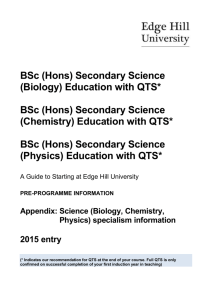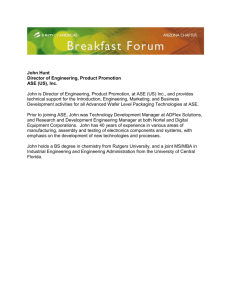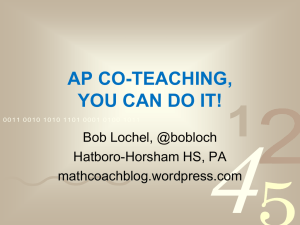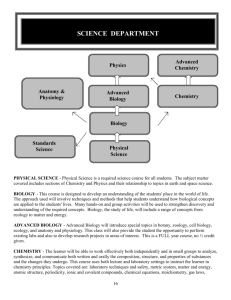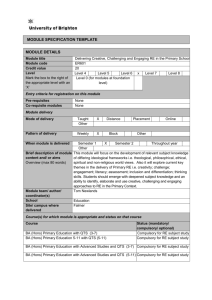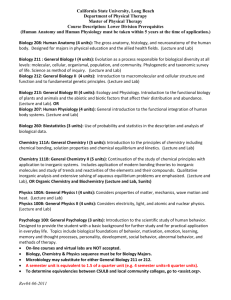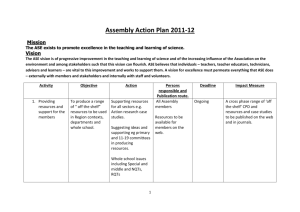Science Year 2 - Edge Hill University
advertisement
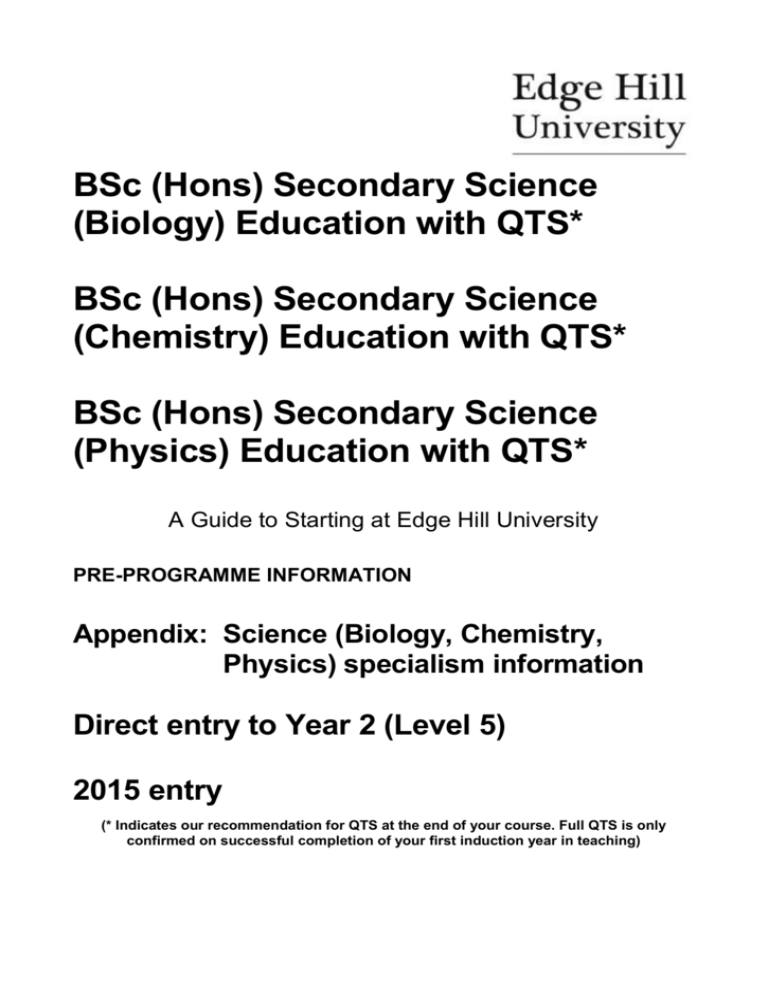
BSc (Hons) Secondary Science
(Biology) Education with QTS*
BSc (Hons) Secondary Science
(Chemistry) Education with QTS*
BSc (Hons) Secondary Science
(Physics) Education with QTS*
A Guide to Starting at Edge Hill University
PRE-PROGRAMME INFORMATION
Appendix: Science (Biology, Chemistry,
Physics) specialism information
Direct entry to Year 2 (Level 5)
2015 entry
(* Indicates our recommendation for QTS at the end of your course. Full QTS is only
confirmed on successful completion of your first induction year in teaching)
Introduction
Congratulations on achieving your place on the BSc Science Degree programme now to get
ready for a challenging and rewarding two years.
September will soon be here when you will be joining us; in the meantime we hope that this
pre-course material will help you be thinking more about science and the start of your career
as a secondary science teacher.
Your First mission: Find a Science Museum / event to visit; this can be one near to home or
when you are on holiday. Fully engage with the experience and enjoy yourselves, then I
would like you to reflect on the visit and be prepared in one of our early sessions to share
with the group :- your experience and how you might use your experience / knowledge of
this museum or part of the contents to inspire / engage pupils in a science lesson.
A substantial part of the degree course consists of science subject study. You are
commencing in year two, with your own additional year’s science background from a wide
range of experience and breadth of science knowledge, possibly mainly in one science
discipline. The course covers a grounding of all three sciences at level 5 [year one] and this
continues into level 6 [Year two]. Only in year three will you concentrate on your chosen
subject area of Biology, chemistry or Physics and in school you will most likely be expected
to teach all three sciences up to GCSE. So you all need a good awareness of all three areas
of science.
To maintain you passion for all three sciences here are a few websites for the three
disciplines with current ideas and news.
Society of Biology
A. www.societyofbiology.org/
Royal Society of Chemistry
B. www.rsc.org
Institute of Physics
C. www.iop.org
Mission – try one of the suggested activities, attend a society event or discover
some cutting edge science in an area other than your specialism.
What did you learn ? How might this be useful in your future teaching?
What will you are you expected to teach in Science?
Look at the National Curriculum, follow these links
The National Curriculum https://www.gov.uk/government/collections/national-curriculum
You need to know all the science but it is useful to be aware of other subjects in particular
mathematics and English. Find out what the age ranges are for the key stages, what age of
pupils will you be teaching at Key Stage 3 [KS3] or Key Stage 4 [ KS4]
Science only : https://www.gov.uk/government/publications/national-curriculum-in-
england-science-programmes-of-study/national-curriculum-in-england-scienceprogrammes-of-study#year-3-programme-of-study
Become familiar with the key terminology;
Key stages {age ranges]
Attainment
Programme of study {POS}
Spoken language
non-statutory
Scientific Knowledge
Working scientifically
Methods Science
Specific subject teaching ideas look at the following:
Reiss, M. (ed.) (2011 ASE SCIENCE PRACTICE: Teaching Secondary Biology Hodder
Education
Taber, K.. (ed.) (2012) ASE SCIENCE PRACTICE: Teaching Secondary Chemistry, John
Murray
Sang D., (2011 ) ASE SCIENCE PRACTICE: Teaching Secondary Physics. Hodder
Education
Reflect on your own experience. What will you need to revise in science? Use these
Online resources to help you.
On line Biology Book
http://www2.estrellamountain.edu/faculty/farabee/BIOBK/BioBookTOC.html
Chem1 virtual textbook
http://www.chem1.com/acad/webtext/virtualtextbook.html
Physics classroom
http://www.physicsclassroom.com/
How useful these are to you? Would you use again? If so keep the reference safe
All science courses require a certain competence in Maths. Support will be given during
the course however some general mathematic revision would be beneficial to you and the
following might be useful.
Contemporary Mathematics in Context
https://www.mheonline.com/assets/pdf/CorePlusMath/Course3/coreplusmath_course3_se_sampler.pdf
Mathematics skills –
need revision?
How useful is this
Link?
In respect of the teaching of science, what is known as Subject Application there are a
number of suggested texts that will be recommended but here is one generic book which you
may find useful to acquaint yourself with some of the current issues in (science) education by
scanning/reading through the text that can be found on the Association of Science Education
website http://www.ase.org.uk/about-ase/
Hollins M. (2011) ASE Guide To Secondary Science Education
(ASE Guide to Secondary Science Education covers a wide range of topics about learning and teaching science in the
secondary school. )
The other place to review for general education information is:
The Times Educational Supplement
https://www.tes.co.uk/
Keeping children safe is an important part of your role as a teacher the following is the
current statutory guidance for schools that you need to be aware of.
https://www.gov.uk/government/uploads/system/uploads/attachment_data/file/372753/Keepi
ng_children_safe_in_education.pdf
Nobody Forgets a Great Science Teacher, remember, they may have been
your inspiration to become a science teacher yourself.
Think back to your time at school / college, try to remember your favourite science teacher.
What was special about this teacher? What contributed to their success? [think about
personality, style, inter-personal skills, command of subject, types of activity etc] Make a list.
Thinking about your future:-
1. Where do you see yourself in 4 years time?
2. In your view what makes a good science teacher? What are the key attributes?
3. How do you plan to become a good science teacher?
4. What attributes do you already have and what areas do you need to develop?
(you will continually review and challenge these ideas over the three years)
I do hope you will enjoy preparing for University and finding out more about science and
aspects of learning / teaching.
Please think about the teacher that you wish to become and keep this as your goal
and focus. Continue to observe and discover the world and wonders of science so
you are ready to start inspiring your pupils.
If you do have any questions prior to the start of the programme feel free to contact me.
Enjoy your summer vacation and I will look forward to welcoming you to Edge Hill Bioscience
in September ready to begin your journey as a trainee science teacher
Kind Regards
Judith Thomas
Science undergraduate Course Leader
thomasju@edgehill.ac.uk
01695-584642
